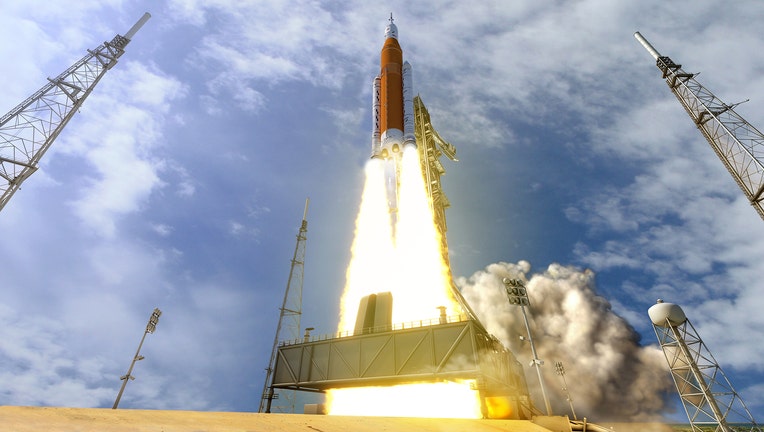Winners of NASA essay contest will witness 1st Artemis deep space exploration launch in 2021

NASA's Space Launch System rocket will launch with Orion atop it from Launch Complex 39B at NASA's modernized spaceport at Kennedy Space Center in Florida. (NASA)
NASA is offering three lucky students a chance to win an all expenses paid trip to the NASA Kennedy Space Center in Florida to watch the Artemis 1 launch, which is scheduled for fall 2021.
The Artemis 1 mission will be “the first in a series of increasingly complex missions,” NASA said in a statement.
“Artemis I will be an uncrewed flight test that will provide a foundation for human deep space exploration, and demonstrate our commitment and capability to extend human existence to the Moon and beyond,” the agency added.
The Artemis Moon Pod Essay Contest was created by a joint effort between Future Engineers and NASA to challenge students to write about “leading a one-week expedition at the Moon’s South Pole,” according to the contest rules.
“Write an essay that tells us about the types of skills, attributes, and/or personality traits that you would want your Moon Pod crew to have and why. How many would be in your pod? Also describe one machine, robot, or technology that you would leave on the Moon to help future astronauts explore,” the rules state.
There will be three separate contest categories based on grade level: Grades K-4; Grades 5-8; and Grades 9-12. Entries may only be submitted by students who are legal residents in the United States.
One specific stipulation that the rules noted was that anyone who is related to or lives within the same household as an employee at NASA or Future Engineers will not be allowed to enter the essay contest.
All contestants will be required to submit an essay which should include a title that is no more than 75 characters and a predetermined word count, which differs for each grade category:
- Grades K-4: Maximum 100 words
- Grades 5-8: Maximum 200 words
- Grades 9-12: Maximum 300 words
RELATED: NASA starts assembling Artemis Space Launch System rocket
All entries must be received by Dec. 17, 2020, at no later than 11:59 p.m. PT. The judging criteria will be four-fold:
- “Your Moon Pod crew’s ability to address the challenges and opportunities of exploring the Moon,” which can earn up to 40 points.
- “Usefulness of your proposed science or technology left on the moon,” which can earn up to 40 points.
- “Originality and innovation of the ideas presented,” which is worth 10 points,.
- “Quality of the essay,” which is worth another 10 points.
Another important condition that was highlighted in the contest rules is that entrants must not reveal their names or addresses for privacy reasons.
“Don’t write your name, or anyone else’s name (eg. your friend, teacher, or parent) in your essay or title,” the contest rules state. “Don’t submit an address, email address, phone number, or any combination of information that could be used to identify or contact a student.”
There will potentially be a total of 168 winners consisting of 156 semifinalist winners who are eligible to win an Artemis prize pack with a retail value of $375, as well as four free invitations to Artemis Explorer virtual sessions with NASA experts.
Nine finalists winners will receive a three day, two night all expenses paid roundtrip to the NASA Johnson Space Center in Houston, TX, “to learn about Artemis and moon exploration.” Winners can bring one parent as a guardian for the trip.
The three grand prize winners will get a three day, two night all expenses paid roundtrip to Kennedy Space Center where each winner, as well as up to three additional family members, will get to watch the Artemis 1 launch into space.
Semifinalists will be announced on Mar. 17, 2021, finalists will be announced on April 7, 2021, a finalist interview will be conducted on April 29, 2021, and winners will be announced on May 19, 2021.
For more detailed information, visit futureengineers.org.

